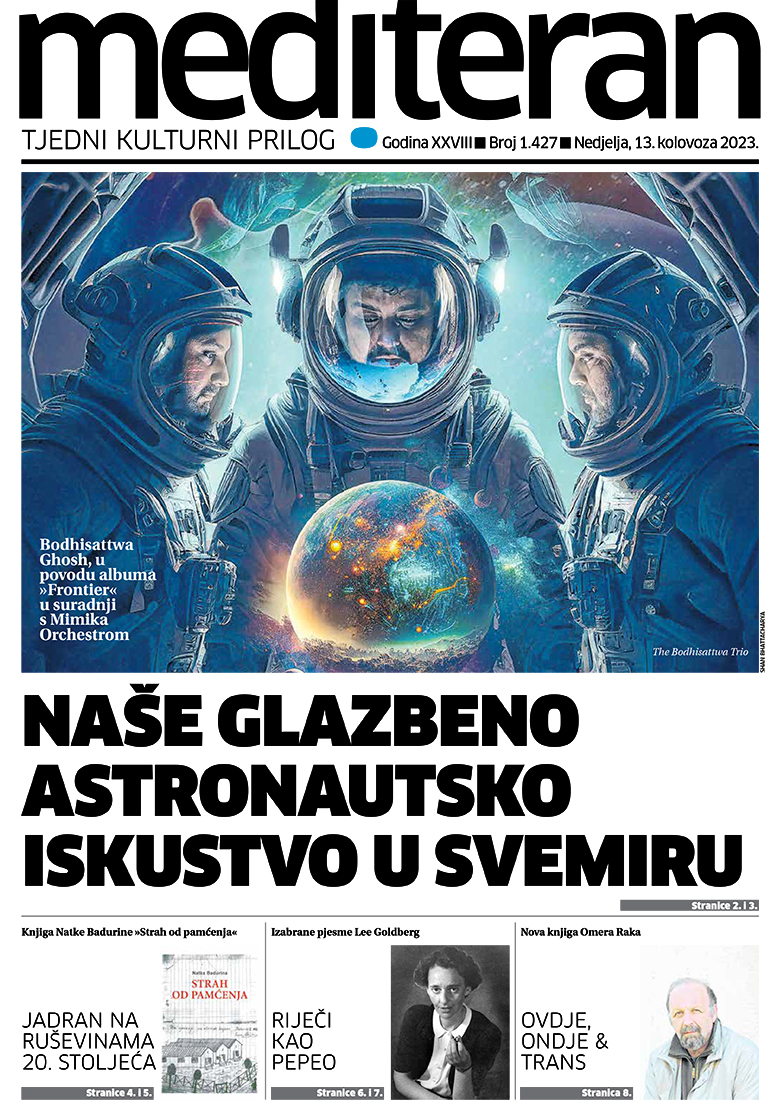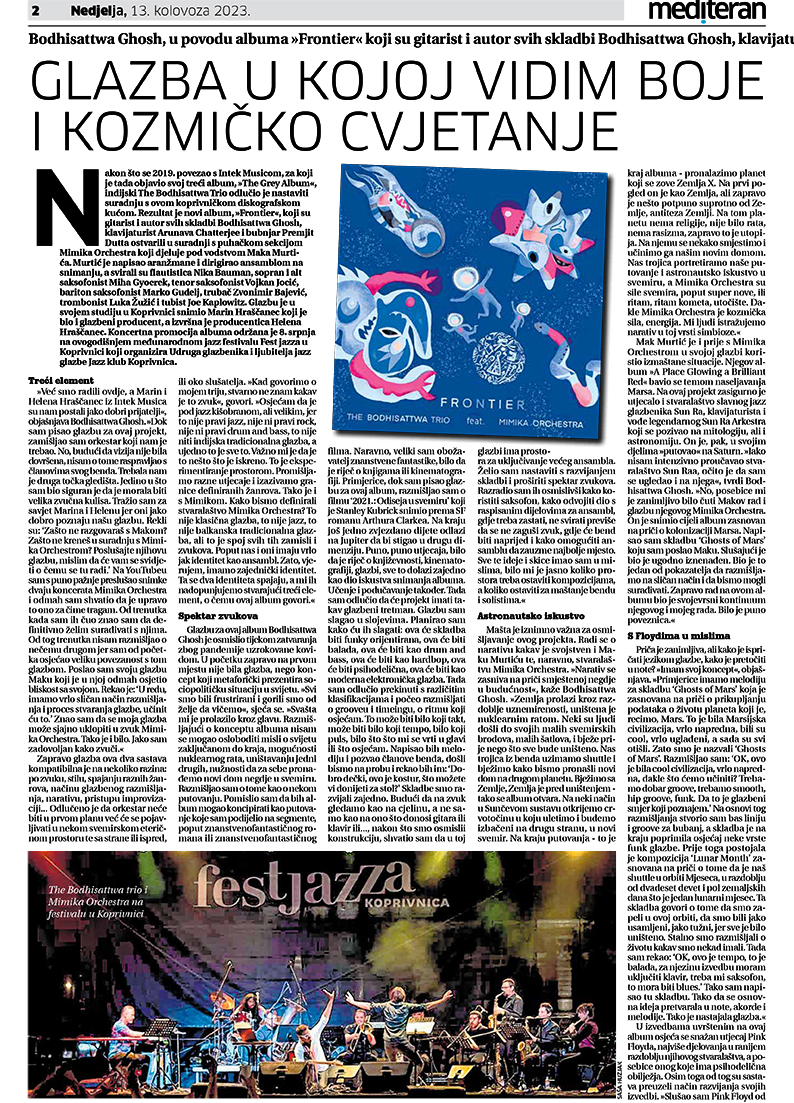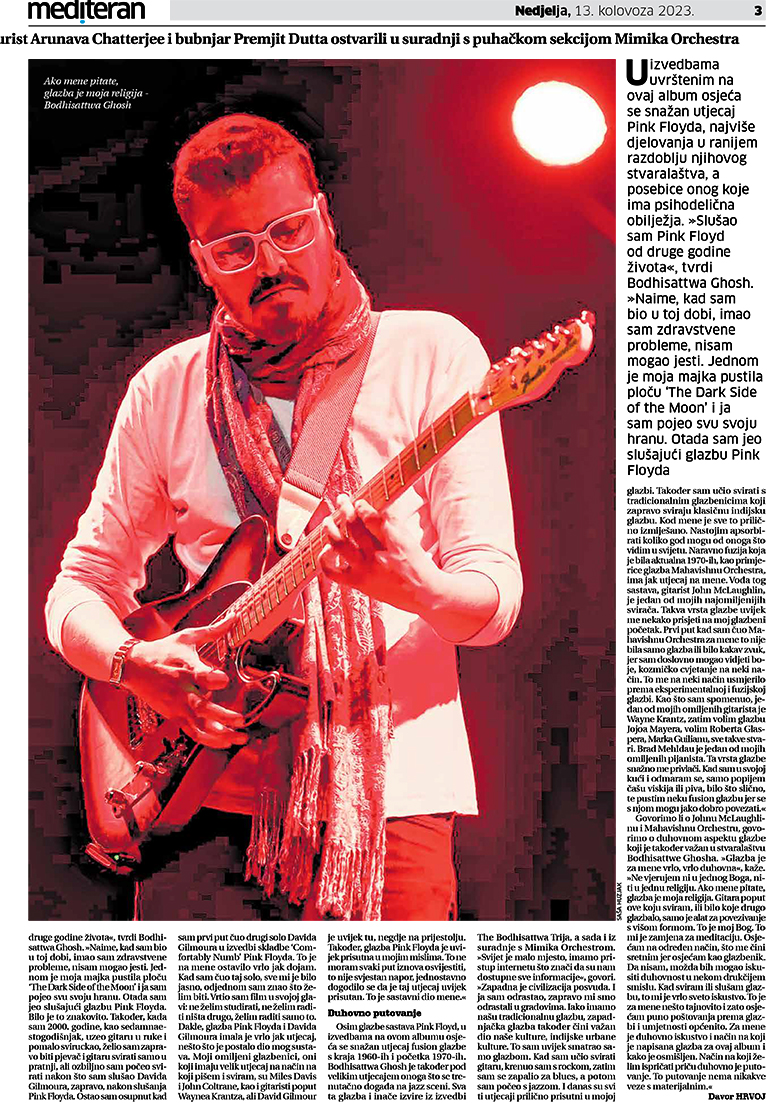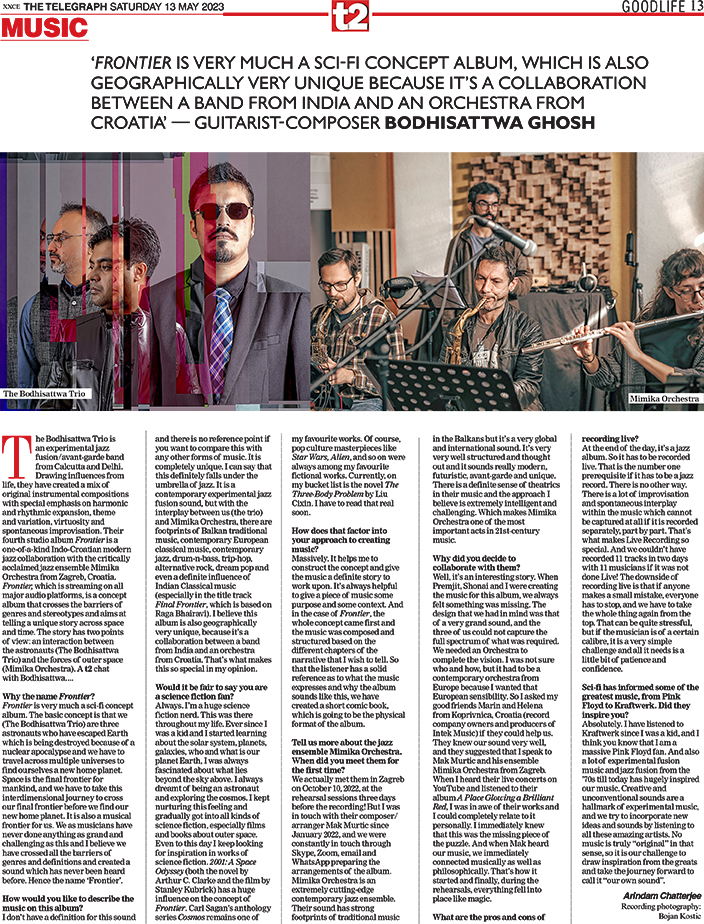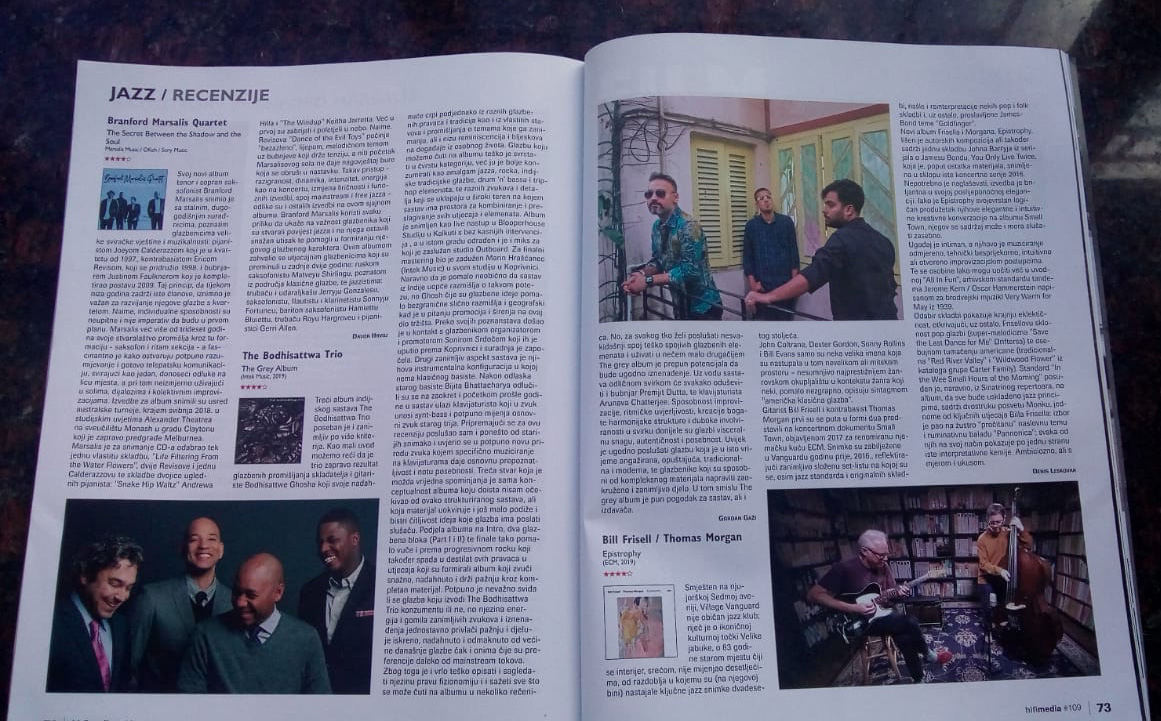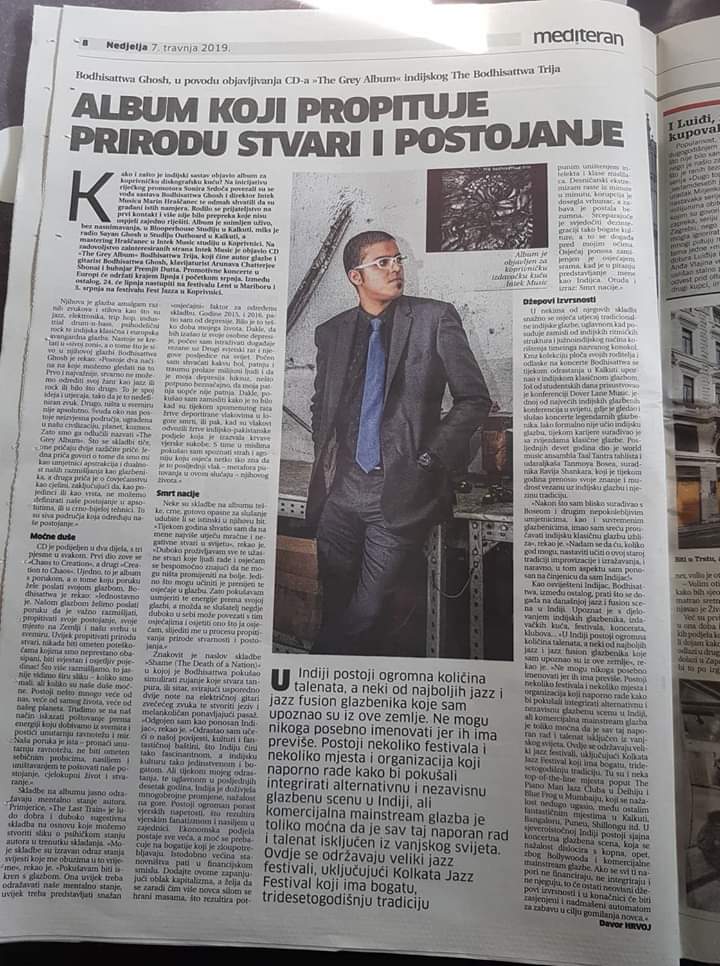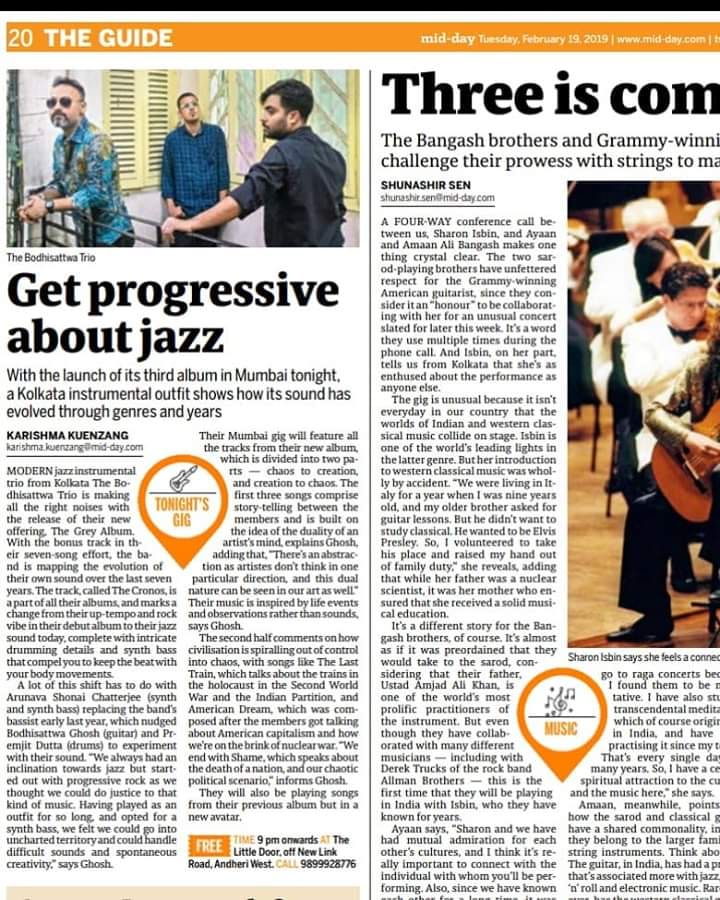How does that music resonate in your head?
Whatever I hear and especially if I like what I hear, the sound/s have a very strong imprint in my head. Be it a song, or a groove or even a particular phrase of music. So that really helps me to analyze and process what I hear, and most of the times I can interpret what I hear to apply an idea in my compositions.
How do you hear vibrations coming from the outside world?
The biggest influence on our music is life itself. Life and all its experiences, its beauty as well as its ugliness, all the good things as well as the horrible things have an impact on us. So all these vibrations coming in from outside shape us into the people we are, and hence make us the musicians that we are. Music is just a part of life, so all the phenomena around us heavily inspire us to think, to feel, to understand and to create. Since we are musicians, the only way we can contribute to society is by making music.
Does this inspire you to make music?
Yes, very much. (please refer to answer to previous question)
How much is sound – sound shaping – important for your creativity?
Sound shaping or sound designing is extremely important. Personally as a composer, I try to listen to the end product inside my head when I am writing a piece of music. Everything is inter-dependent on each other. A melody line is incomplete without the groove, a groove itself will transform into a song with the harmonic and melodic information, and overall the individual volume treatments, tones, textures will give the sound a distinct identity. And exactly which sounds to put where, which texture has to be given more priority at what particular point in the composition is absolutely essential. So I feel it is extremely important to put a lot of attention to detail as far as sound shaping is concerned. The right treatment will do justice to the composition, and the wrong treatment will completely destroy it, doesn’t matter how well it’s played! It is ultimately what the listener is listening to that is all important, which is what our ultimate aim should be.
Why do you not miss the bass player?
It is not true that we don’t miss the Bass player. Let’s just say that it’s a different sound. With a Bass player, the soundscape and vibe is completely different, and with this band the extra emphasis will have to be put on the Bass playing and the contribution of the instrument in all its aspects. The player himself will have a crucial role. But in this album, the sound is very keyboard oriented. The emphasis lies in the skills of the pianist and the choice of sounds from the keyboard. To fill in the low frequencies, the keyboard player (Shonai) has doubled up with Synth Bass, but the Synth Bass as a dedicated instrument is actually just a support to the other parts that he is playing, and not an instrument which will take the front seat. In areas where he is playing piano with his both hands, say our tune „Triple Standard“, I take care of Bass duties with my Octave pedal, providing a support on the low frequencies to his piano solo. So right now, the leading instruments are- Guitars, Keyboards, Drums. And the Bass is a supporting instrument which holds the band together and fills up those frequencies. So that’s why we don‘t miss the Bass player. We have designed the sound according to our strengths and limitations.
Why do you want to connect electrically and acoustically?
We believe in synthesis. In this band, we have tried to create an amalgamation of whatever sounds the three of us can collectively bring to the table in order to fully express ourselves. So, be it a completely synthetic soundscape involving synthesizers and effects on the drumkit, or a fusion Electric Guitar sound, or simply an acoustic piano, it is the method of execution that is important, rather than sticking to conventional segreation of electric/electronic and acoustic elements. We have tried to bring out a sound that we can call „unique“ and something that we can claim to be truly ours, so we have tried to bring out that sound by bridging the gaps between genres and forms and conventions.
Which ideas guide you when you are composing songs?
Technically speaking, I always think of time first. What kind of rhythm is going on in my head. So I try to expand a rhythmic idea and imagine whatever melody or harmony can fit into that rhythm. When the idea seems alright in my head, I sit with a pen and paper and my guitar to technically put down my thoughts. Then I hold a rehearsal session with the band, and they come up with their own ideas on the composition. After a few rehearsals working on the same tune, when all three of us are collectively happy with the way the composition is sounding, we decide to lock it down and play it a few more times to complete the process. Philosophically, everything contributes to the making of a composition. Events that affect us, our emotional state of mind, a strong feeling, etc. All of these energies reflect in the way that we compose and execute our music.
Can we say that the music on this album is a reflection of today’s moment but also of the industrial age?
I wouldn’t say that it particularly reflects the specific era of the Industrial age, but I look at it like a reflection of today’s times, as a result of the entire journey of mankind which has led up to the state of the world today. We must not forget who we are, what has shaped us over the course of history, and most importantly, how and why we are what we are. Personally I am very interested in world events of the late 19th century and the entire 20th century, so maybe you can say that the album reflects the times of the industrial age as well.
What message do you want to send with your music?
It’s simple. With our music, the message that we want to put out is to think. To question one’s very existence, his/her place on the Earth, and our purpose in the universe. To always question the nature of things, never to be numbed by the distractions that come our way easily, to be an aware and sensitive individual. The more we think, the more we see the bigger picture- how small we are, yet how powerful our souls are. There is something much bigger than us, bigger than life itself, bigger than our planet. We are trying in our way to pay respect to the energy we are receiving from the cosmos and acheive inner balance and peace, and our message is the same- to find oneself from within and find our inner balance, not be swept away with selfish gains, violence and destruction, but to be respectful of our existence and honour all life and creation.
How much is your music reflecting your mental state?
Entirely. My compositions are a direct reflection of the state of mind I am in at that time, and I always try to be very honest with the music, in the sense that it should always reflect our mental sate, and that always installs a strong ‚feel‘ factor to the compsition.
“The Last Train” is a crazily good and deeply suggestive composition. What kind of psychological condition did you have when you wrote that song?
In 2015 and 2016 I was suffering from depression and I went through a very bad time in my life. So, to get out of my personal depression I started researching on the 2nd World War and its aftermath on the world. I started realising what kind of pain, suffering and trauma millions of people went through, and that my depression was a luxury and totally meaningless and my suffering is no suffering at all. So, I tried to imagine what it was like for the victims deported on trains to death camps during the war, or the trains carrying victims of the India-Pakistan partition which spawned a year of bloody religious conflict, and in this composition I tried to capture the fear and agony that one had knowing that this the last train ( the metaphor of a journey in this case) of their life.
Some songs are heavy, dark, almost dangerous. Why did you want to achieve such a feeling?
Over the years I have realised that the dark and negative things in the world affect me the most. I somehow feel very strongly about all the horrible things that people do and I feel helpless knowing that I cannot change anything for the better. The only thing that I can do is to translate these feelings to music, and I try to channelize these energies towards my music, and maybe the listener can relate to these feelings somewhere deep inside and feel what I am feeling, and in the process question the very nature of reality and existence.
Did you listen to psychedelic rock and did that music affect your work?
Yes, I have been listening to Psychedelic Rock from a very young age, and Pink Floyd is my all-time favourite Rock band, and obviously being a guitar player, I am a die hard fan of Jimi Hendrix. So obviously I guess that will have an impression on my music.
Did you listen to the prog rock and did that music affect your work?
Yes I have listened to some progressive rock, but I have never been truly into it as a listener. I love bands like Rush and King Crimson, but particularly I don’t think I was so heavily inspired by Progressive Rock. The odd time signatures in our compositions are mostly coming from Indian Classical music.
Did you listen to jazz-rock and how did that music affect your work?
Yes, very much. Wayne Krantz is one of my all time favourite musicians, and acts like Mahavishnu Orchestra, Screaming Headless Torsos, Tribal Tech, Oz Noy have captured my imagination. Not just Jazz Rock particularly, but Jazz Fusion in all its aspects have tremendously influenced our writing and playing.
Which music influences your work the most?
Almost all kinds of music have very strong impacts on our music, but I will say that Jazz (be it traditional or modern, Bebop, Postbop, 80’s fusion or New Jazz), Indian Classical music(mainly because of the modal approach and the rhythmic system) and Electronica(Ambient, Trip Hop, Drum-n-Bass) have the maximum impact on our thought process.
What incentives do you focus on in your composing?
[I am not sure of the question, but the overall incentive is to be able to make the music sound exactly like the way I imagine it at first]
How influential the Indian traditional music is in your works, such as in the song”Shame (The Death of a Nation)”?
In this song, I have tried to simulate a drone that is caused by a tanpura, or even a Sitar by playing 2 side by side notes on a ringing Electric Guitar sound to create an eerie and melancholic repetitive passage. Other than that, we haven’t kept anything consciously Indian in the song, just tried to create a vibe that sounds „Indian“. In some of our other tunes, the traditional Indian music influence is much stronger, mainly when we are borrowing ideas strongly from the Indian rhythmic structures and the South Indian method of counting time called „Konokol“, which helps us immensely to count odd time signatures and polyrhythms.
Could you explain that title?
Well, I have been brought up as a very proud Indian. I have grown up learning about our history, our culture and our fantastic heritage, which makes India such a fascinating place and Indian culture so unique and rich. But as I have been growing up, mainly in the last 10 years or so, India has undergone a number of changes, unfortunately for the worse. There is a tremendous growth of religious tension, resulting in religious fanaticism and communal violence. The economic divide is getting bigger, and power is shifting to the richer and being misused, with the majority of the population suffering financially. Add to this an overbearing cloud of capitalism, and the desire to make more money is being force-fed to the masses, resulting in the complete obliteration of intellect and the thinking class. Right wing extremism is growing by the minute, corruption has hit the roof and entertainment has become mindless. Seing such a rich culture disintegrate before my eyes is extremely heartbreaking, and the feeling of pride has been replaced by a feeling of shame, when it comes to introducing myself as an Indian. Hence the phrase : Death of a Nation.
How did you study India’s traditional music?
Well, growing up in Kolkata I have been exposed to a lot of Indian Classical music through my parents‘ record collection as well as a lot of live concerts. In fact, since my college days, I have had the honour of attending the Dover Lane Music Conference, one of the biggest Indian music conferences in the world, to watch and listen to legendary musicians Live. Though I haven’t learned Indian music formally, I have had the honour of working with a lot of stellar Classical musicians in my career. For the last 9 years I have been a part of „Taal Tantra“, the World music ensemble of Pt. Ravi Shankar’s Tabla player Tanmoy Bose, who has over the years passed on his knowledge and wisdom on Indian music and its tradition. Having interacted so closely with him and other stalwarts as well as some contemporary musicians, I have had the fortune of studying Indian Classical music up close, personal and „on-the-job“, and I hope to continue to learn as much as I can about this age old tradition of improvisation and expression, and yes, in this aspect I am very proud of the fact that I am an Indian!
What is the jazz and fusion scene in India today – musicians, record labels, festivals, concerts, clubs, traditions …?
I believe there is a tremendous amount of talent in India, and some of the finest Jazz and Jazz fusion musicians that I have met are actually from this country. I can’t really name anyone in particular because there are too many. There are a few festivals and some venues and organisations who work very hard to try and integrate the Alternative and Independent music scene in India, but the mainstream commercial music is so powerful that all of this hard work and talent gets shut out from the outside world. There are some great Jazz festivals that happen here, including the Kolkata Jazz Festival, which is a traditition that has been going on for more than 30 years now, and there are some top-of-the-line venues like The Piano Man Jazz Club (Delhi) and Blue Frog (Mumbai, which unfortunately shut down) amongst other fantastic venues in Kolkata,Bangalore, Pune, Shillong, etc. There is a great Live music scene in North East India as well which unfortunately gets shut out from the mainland, again, due to Bollywood and mainstream commercial music. If all these efforts are not funded, integrated and nurtured then these will remain independent pockets of brilliance, ultimately to be outdone and outrun by the money making entertainment machine.
Davor Hrvoj


